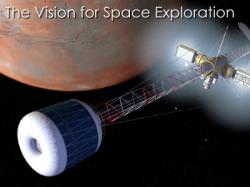A panel of 50 space experts met recently to discuss NASA’s current direction with its Vision for Space Exploration. While the conference, “Examining the Vision: Balancing Science and Exploration” was seemingly billed as forum for discussing alternatives to the moon/Mars vision, attendees endorsed NASA’s current direction and then concluded what anyone with an eye on NASA already knew: NASA isn’t receiving adequate funds in line with the grand goal of sending humans to Mars.
The panel of scientists, engineers, and former astronauts and NASA administrators concluded that NASA is on the right path with its objectives of going to the moon as a stepping stone to reach Mars, but those goals are in danger because of chronic underfunding to the US space program.
“The nation’s space program is in peril,” said Stanford Professor Scott Hubbard, former director of NASA’s Ames Research Center, and an organizer of the conference. “You simply cannot continue doing more with less and meet these goals. That is a fact. This workshop achieved a consensus that NASA’s resources have not been commensurate with its mandated missions of exploration and science.”
The panel did say, however, that NASA should focus more on sending humans to Mars instead of building large bases on the moon. But also, former astronaut Kathryn Thornton said before the meeting, she felt the best way to get to Mars was going there directly. But the meeting changed her mind, she said, and she now believes there are benefits to using the moon as a way station, such as scientific research and testing rocket hardware and infrastructure.
Alternatives such as going to asteroids was discussed, but not endorsed by the panel. Also of interest is that the panel said science is not the major motivation for human spaceflight.
But the panel concluded that any human ventures out of low earth orbit should be international in nature. “The next administration should make the human spaceflight goal an international venture focused on Mars–both to bring in more public support and to sustain the program politically,” said Louis Friedman, Executive Director of The Planetary Society.
In particular the attendees agreed to the following statements:
- It is time to go beyond LEO with people as explorers. The purpose of sustained human exploration is to go to Mars and beyond. The significance of the Moon and other intermediate destinations is to serve as steppingstones on the path to that goal.
- Bringing together scientists, astronauts, engineers, policy analysts, and industry executives in a single conversation created an environment where insights across traditional boundaries occurred.
- Human space exploration is undertaken to serve national and international interests. It provides important opportunities to advance science, but science is not the primary motivation.
- Sustained human exploration requires enhanced international collaboration and offers the United States an opportunity for global leadership.
- NASA has not received the budget increases to support the mandated human exploration program as well as other vital parts of the NASA portfolio, including space science, aeronautics, technology requirements, and especially Earth observations, given the urgency of global climate change.
The panel gathered privately on Feb. 12-13, 2008 to discuss space policy options facing the new US administration that will take office in January 2009, and may offer more recommendations in the future.
Original News Sources: New Scientist, Planetary Society Press Release


